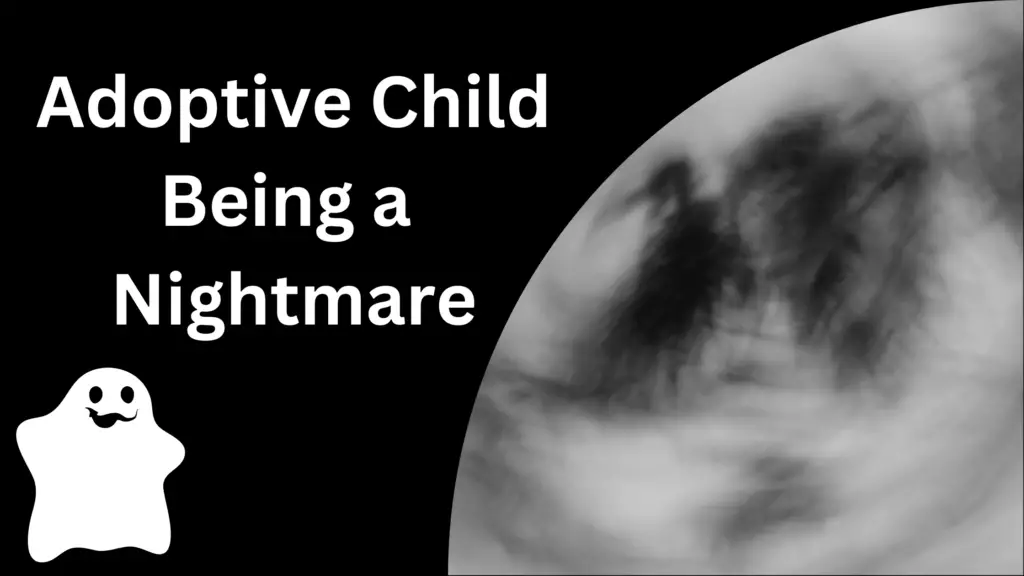An unexpected situation in adoption is experience tough times which emanate from the adopted child. Most adoptive parents have opened up experiencing such moment and even found themselves stating: My adopted child is a nightmare. It is true that getting along with an adopted child can be challenging at times. As an adoptive parent, one needs to know how to deal with the situation.
If you have ever stated “my adopted child is a nightmare”, then you are in the right place. Throughout this article, you will be offered guidance, support, and strategies to help you navigate these rough waters and find the solutions you need. The answer to “my adopted child is a nightmare” is about understanding the adoption journey, identifying the source of challenges, communication and connection with the adopted child, discipline and boundaries, building a support network and having self-care as the adoptive parent.
Understanding the Adoption Journey
Adopting a child is a unique and deeply rewarding experience that can also present its share of challenges. It’s essential to recognize the impact of the child’s early-life experiences on their behavior and emotions. Many adopted children come from difficult backgrounds, such as abandonment, neglect, or exposure to trauma. As a result, they might struggle with adjusting to their new home and family.
Understanding the child’s perspective is crucial during this journey. Remember that they might be dealing with complex emotions and fears they can’t fully express. Adoption can bring a mix of excitement and uncertainty for the child. They may be eager to form connections and trust their new family, but they might also harbor anxieties about being abandoned again or fear of rejection. Being patient and empathetic with your child is vital as they navigate this emotional terrain.
To facilitate a smoother transition, try to create an environment that fosters openness and acceptance. Share your feelings with your child, let them know they can trust you, and assure them that it’s normal to have various emotions during this time. Allow them the space to express themselves and provide reassurance that you’re there to support them no matter what.
Identifying the Source of Challenges
Are you saying “my adopted child is a nightmare?” Then you might not be aware of the issues that the child has gone or is going through.
As the adoptive parent, understanding the source of the challenges your adopted child faces is critical in providing appropriate support. It’s essential to differentiate between typical child development challenges and those directly related to their adoption experiences.
Some adopted children may exhibit emotional and behavioral difficulties due to their early-life adversities. They might display attachment issues, such as difficulty forming secure bonds or feeling uneasy with physical affection. Other challenges could include trust issues, low self-esteem, or even difficulty regulating emotions. These struggles can manifest in various ways, including tantrums, withdrawal, or difficulty in forming connections with others.
To identify the root causes of these challenges, take time to observe your child’s behavior and emotions closely. Keep lines of communication open and encourage them to express their feelings and thoughts. Additionally, consider seeking professional help from therapists or counselors specializing in adoption-related issues. A skilled professional can conduct a comprehensive assessment and offer valuable insights into your child’s unique needs.

The Impact of Attachment and Trust
Attachment is a fundamental aspect of a child’s development, influencing their emotional well-being and future relationships. For adopted children, forming secure attachments might be particularly challenging due to their early experiences. The lack of consistent caregivers during their early years may lead to difficulties in trusting and connecting with others.
Building a strong and secure parent-child bond is essential for your adopted child’s emotional growth and development. This process may take time and require consistent efforts. Be patient and understanding, providing them with the safety and support they need to feel secure. Allow them to set the pace for building trust and forming attachments, ensuring they feel safe and valued in your family.
As you interact with your adopted child, be consistent in your responses and show unconditional love. Engage in activities that promote bonding, such as reading together, playing games, or simply spending quality time as a family. Creating positive experiences will help your child associate you with safety and comfort, fostering a more secure attachment.
Communication and Connection
Open and honest communication is the foundation of any healthy relationship, and it’s even more critical in adoptive families. Encourage your child to express their feelings and thoughts freely, and be ready to listen without judgment. Let them know that their emotions are valid and that you are there to support them.
Establishing a safe space for open dialogue will strengthen your relationship with your adopted child. Encourage them to talk about their adoption story and their feelings related to it, but respect their boundaries if they’re not yet ready to share. As they grow and develop, maintain open channels of communication, making it easier for them to come to you with any concerns or questions they may have.
Incorporate family activities that promote bonding and strengthen your connection. Create rituals, such as family dinners or weekend outings, to foster a sense of belonging and togetherness. The more connected your child feels to the family, the more secure they’ll feel in their place within it.
Read About: Why Adoptees Should Not Know Their Birth Parents
Discipline and Boundaries
Disciplining an adopted child requires sensitivity and understanding. Adopted children may have experienced unpredictable or inconsistent discipline in their past, leading to uncertainty about the consequences of their actions. It’s essential to establish clear and consistent boundaries in your household, providing a sense of structure and stability.
Ensure that your disciplinary strategies focus on promoting growth, understanding, and learning rather than punishment. Positive reinforcement and rewards can be powerful tools in shaping your child’s behavior and encouraging positive habits. Celebrate their achievements, no matter how small, and praise their efforts to create a nurturing environment that supports their emotional growth.
Always keep in mind that discipline is an opportunity for teaching and guidance rather than a means of control. Be patient and consistent in enforcing boundaries, while also considering your child’s emotional state and their unique needs.
Building a Support Network
Still saying “My adopted child is a nightmare?” Try having a support network.
Parenting an adopted child can sometimes feel isolating, but remember that you’re not alone. Don’t hesitate to seek support from other adoptive parents who have faced similar challenges. Sharing experiences and advice can be incredibly valuable and provide you with fresh perspectives and coping strategies.
In addition to connecting with other parents, consider reaching out to adoption-specific resources, support groups, or therapists specializing in adoption-related issues. Professionals with experience in adoption can offer valuable insights and guidance, helping you navigate through challenging times.
Building a support network will not only provide you with practical advice but also emotional support during times of difficulty. It’s a reminder that you’re part of a community of parents who understand the unique joys and challenges of adopting a child.

Self-Care for Parents
Parenting a challenging adopted child can take an emotional toll on parents. It’s crucial to prioritize self-care to maintain your own well-being and effectively support your child. Be kind to yourself and avoid feelings of guilt or failure. Remember that parenting is a learning process, and it’s okay to seek help when needed.
Take time for activities that bring you joy and relaxation. Engage in hobbies, exercise, or practice mindfulness to reduce stress and anxiety. Prioritize your mental health and consider seeking therapy or counseling if you find it helpful. A healthy and balanced parent will be better equipped to provide the love and support their child needs.
Seeking Professional Help
Despite your best efforts, some challenges may persist. In such cases, seeking professional help is a proactive step toward finding solutions and creating a healthier family dynamic. Adoption counselors, therapists, or psychologists can provide valuable guidance and support tailored to your family’s unique situation.
These professionals are experienced in working with adoptive families and can help you navigate through complex emotions and challenges. They can offer coping strategies and practical advice to address specific issues that may arise during the adoption journey.
Remember that seeking professional help doesn’t mean you’ve failed as a parent. On the contrary, it shows your commitment to providing the best possible support and care for your adopted child.
Celebrating Progress and Successes
Parenting an adopted child can be challenging, but it’s essential to recognize and celebrate the small victories and progress your child makes. Each milestone achieved, no matter how seemingly minor, is significant and should be acknowledged.
Focusing on the positives will help you and your child maintain a more positive outlook on the adoption journey. Celebrate their achievements, whether it’s academic progress, improved behavior, or developing new skills. This positive reinforcement boosts their self-esteem and sense of accomplishment, fostering a healthier emotional development.
Remember that the adoption journey is a continuous process, and there will be ups and downs along the way. Celebrate every step of progress, knowing that your love and support are making a profound impact on your child’s life.
Final Remarks
Adopting a child can be a challenging and rewarding experience, but it is important to understand that not all children will be easy to parent. By seeking professional help, practicing coping strategies, and working with the help of a support network, parents can help their adopted child overcome their challenges and build a positive future together.







